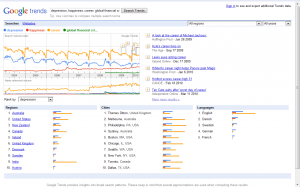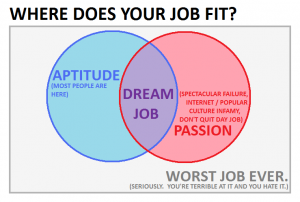- A Tale of Two Generations
- The Aptitude/Passion Disconnect – Being Good At Something You Don’t Like
- The “I Might As Well” Trap – Confusing Sunk Costs, Incremental Costs and Opportunity Costs
- The Chinese Tradition Trap – Failure Is Not An Option
Many people spend their lives wishing they were good at something. They look at people who are good at that something and they envy them. And because of that, it is not socially acceptable for someone to dislike something they are good at, since they will inevitably cop a backlash of “How can you say that? You’re so good at it! I would love to be as good as you are.”
There’s an overwhelming expectation or assumption that if you’re good at something (i.e. you have aptitude for it), you must enjoy it (i.e. you have a passion for your aptitude). I think this is a fundamentally flawed assumption. We can be great at things we don’t like and we can love things we’re completely hopeless at.
I have great attention to detail, an ability to understand complicated issues or concepts quickly and analyse a set of facts. This makes me very, very good at being an external auditor. But I spend most of my free time buried in a fantasy novel, going to shows, playing the piano or reading design blogs. This means my job – where 90% of the time is about whether you’ve ticked a box in a checklist or not – is a horrible fit given my passion for the creative arts.
The logical conclusion is obvious. A lifetime of being good at something that you don’t like and not being allowed to express the fact that you don’t like it means you end up with a lot of issues, such as disliking your job but not being able to quit, thinking there is something fundamentally wrong with you for not liking something you’re good at and so you keep on trying even though you really don’t like it and internalising all your misery and end up depressed, burning out, having a nervous breakdown or all of the above.
Depression: Affects More People Than You Think
Since I officially moved out into my own apartment in August last year, I’ve been getting a lot of junk mail. Generally, it’s the usual run of IGA catalogues, real estate agents hounding me about either selling my place or renting it out, and pizza coupons and takeaway food menus. I also got pamphlets and handy fridge magnets from Beyond Blue, an Australian organisation dedicating to providing information about depression to the general population at large. At work, I also constantly see signs notifying everyone that there’s a free counselling service available to all partners and employees.
The most recent ABS study on mental health and wellbeing in 2007 found 1 in 5 Australians suffer from mental illness each year with depression being the second most common disorder. Running the numbers, that means over 650,000 Australians suffer from depression each year.
Up until recently, I pretty much shrugged off all the facts and figures and everything being shoved in our face about depression. It wasn’t until I started talking to my friends and colleagues and listening to my parents talk about their network that I really started paying attention:
- Most of my colleagues at senior accountant level and below are not happy at work. Accounting firms are in a high turnover industry but the recent spate of resignations at the level at which they are happening is ridiculous. Over the last 12 months there’s been more than 10 senior accountants and half of the experienced junior accountants have left in my division alone, with more contemplating their alternatives, like Matthew Caldicott who is a junior accountant in the Financial Services division and took a career break to go on MasterChef Australia 2010.
- My managers at work appear to be generally content with staying in their jobs, even if they are getting hammered by client deadlines.
- My partners at work love it. Probably because they get an average cash salary of $500k.
- Most of my ex-colleagues who have left are far, far happier than before and don’t regret a thing.
- Most of my colleagues who are still here have stayed because they like their colleagues.
- In every single farewell speech I have ever heard and departure email I have ever read, everyone always mentions the great people they worked with – no one has ever mentioned the great work.
- My happiest friends are not the ones with the flashiest cars, most expensive clothes or highest-paying jobs.
- My happiest friends are the ones who are in jobs where they have both aptitude and passion, or the ones who still have no idea what they want to do but are out there doing their best to find out.
- My unhappiest friends are those who haven’t worked out what they want and haven’t done anything about it.
A Google Trends search on depression, happiness and career shows some interesting results (out of curiosity, I threw in global financial crisis just for kicks).

Obsession: The Pursuit of Happiness
I don’t think anyone will find it surprising that people are obsessed with being happy. We grow up listening to fairy tales where everyone lives happily ever after. We’re brought up with the idealised Great Australian Dream of a house on a quarter-acre block, 2.5 kids and pets. We think having a stable 9-to-5 job, a house like the ones in Better Homes & Gardens magazines and more money than we know what to do with will make us happy.
A whole industry around the pursuit of happiness has developed with companies such as The Happiness Institute providing seminars, training and events based on the science of positive psychology. There’s over 1.3 million research papers on positive psychology and articles in management publications and at least 50 TED Talks on understanding what makes us happy.
What does surprise me is unhappy people can be so 矛盾 (máodùn). They’re unhappy with their lives but they refuse to acknowledge it or, worse, they acknowledge it but refuse to do anything to change their situation or, worst of all, they place their hopes in things which aren’t going to help at all, like lottery tickets or hoping their dream job will fall into their laps from out of the sky or thinking if they wish enough it will come true.
Change is difficult, I know that. I know how difficult it is to fight against your upbringing, what it feels like to contemplate leaving the certainty of a well-paying, stable job and the sense of being overwhelmed by a seemingly unreachable goal. After all, I’m probably crazy in thinking I could go from being an external auditor to writing Broadway musicals.
Repression: The Disconnect Between Aptitude and Passion
By virtue of competition and the laws of supply and demand, most of us end up in jobs where we have some degree of aptitude, but not a great deal of passion. Some of us are not so lucky and end up working dead end jobs where we don’t have any aptitude or passion just to make ends meet. Others decide they’ve had enough – only to fail horribly and/or gain internet/popular culture infamy when it becomes evident they have no aptitude for it. A small group are able to find their dream jobs, but even then, they need to work hard to stay there and some come to realise dreams are not what they seem.

Progression: Keep Trying New Things
千里之行始於足下。
A journey of a thousand miles begins with a single step.
—老子 Lǎozǐ, Tao Te Ching
One of the hardest things to do is to look at yourself critically and acknowledge truths you don’t like.
I don’t like the fact I’ve spent 720 hours in high school, 3 years at university and another 500 hours and $10,000 towards a career I have a lot of aptitude for but zero passion.
I don’t like being torn between wanting to pursue my dreams and the constant internal voiceover telling me music is not an acceptable career path and I should stick to something I’m good at, that’s stable and pays well.
I don’t like the idea of looking back at my life when I grow too old to dream and find that I’ve made no difference at all on the world.
The next hardest thing is doing something about it.
It’s been two years since I came back from New York. Since then, I’ve watched a few shows, started a web design business with a friend, picked up two clients at work in the music/performing arts industry, attended a Talent Development Project workshop, met Lynn Ahrens and Stephen Flaherty and negotiated a flexible work arrangement to allow me some time to figure out what I want to do and I started a piano blog which I’m still not too good at updating.
It’s been exactly one month since I started my flexible work arrangement. In the last month, I closed down my old blog and started this one to keep me accountable to myself so I don’t end up doing nothing at all, watched more shows and went to the UNSW Post Graduate Expo to figure out what my options are. I’ve talked to more people about what I want to do and how to get there and feel like I’m making really slow progress, but progress nonetheless.
My EBA exam is happening in the next month so I don’t expect to get a whole lot done, other than going to more shows and keeping this blog updated. Loathe as I am and as much as I’ll harp on about it, I need to focus and get this done because at this point, the incremental benefits of completing my CA far outweigh the costs.
One step at a time. Get the CA done, then get back on track with figuring how to get to Broadway.

Leave a Reply